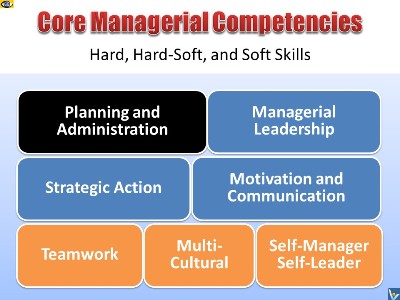|
| |
A managerial competency in general is a set of knowledge, skills
and behaviors that allows a manager to perform his duties
efficiently and effectively. |
|
 |
|
7 Core Managerial
Competencies
The seven core competencies necessary to be a good manager are
planning and administration competency, managerial leadership
competency, self-management competency, strategic action competency,
communication competency, teamwork competency, and multicultural
competency. |
|
| |
...
Planning and Administration as well as
Motivation and Communication are
traditional managerial tasks.
Managerial leadership is a modern managerial
task. To maximize long-term business success, an executive should strive to
be both a manager and a leader and to synergize their functions.
Strategic action competency includes strategic
action planning, strategic leadership by example, and strategic
experimentation with opportunities.
In today’s era of
empowered employees, manager should be not just a team manager but also
a team worker.
Multi-Cultural competence is required to
manage cross-cultural differences, to
harness cultural diversity and to succeed in the globalized marketplace.
Self-management is a traditional managerial competence.
Self-leadership is a new competence necessitated by today’s era
characterized by rapid change.
|
Strategic Action
Creative Management |
Strategic Action Competency
Strategic action competency helps to think and act more
strategically in order to become more proactive and
effective at capitalizing on opportunities and minimizing
threats. Strategic-action competent managers understand how
to balance their daily work demands with longer-term
strategic initiatives.
Understanding the Big Picture
The big picture that includes the company's overall mission,
corporate shared values, company’s sustainable competitive
advantage and competitive position in the market,
relationships among departments or divisions within the
organization, strategic partners and relationships with
them.
Anticipating the Future
A key factor in strategic action is forecasting. A good
strategic manager plans for contingencies and possibilities
based on his/her perception of what the competition will do
next and what the customer will want or need. Strategic
simulation games, like INNOBALL, help anticipate and
address. Futures thinking helps forecast future desires or
target customers.
Taking Strategic Action
The ability to forecast the needs and actions of others
helps a manager to get prepared to outmaneuver the
competitors and to satisfy future customer needs. The key is
to take strategic actions to optimize the chances of success
based on the forecasts and to consider the long-term
implications of any action taken.
Cross-Cultural Competency as a Key to Leveraging Diversity
A globally connected world is a key driver of structural
change for the global workforce. Cross-cultural competency
is the key enabling factor of working in diverse teams. The
diversity of stakeholders is also an important point to
consider. Employee, customers, partners, competitors are all
made up of people of different ethnical backgrounds, who
have different views, perceptions, beliefs, and values.
Creativity and Innovation
Innovation became a systemic phenomenon. It is achieved
through synergizing diversities and is increasingly more
dependent on the collaboration between actors from different
cultural backgrounds who combine their own perceptions,
thinking habits and expertise to create something new. This
happens on all levels − individual, team, institutional.
Diversity of thought increases creativity and, with it, the
innovation potential of individuals, teams, corporations and
joint ventures.
International Business
Business activities that take place abroad emphasize the
importance of cultural intelligence and effective
cross-cultural communication between the business and local
people. Unless company representatives have good
understanding of the local traditions and values, they might
behave in such a way that is considered offensive or
inappropriate in another culture and facilitate conflict,
putting the whole local business at risk. In order to
effectively perform business activities in a different
cultural setting, company representatives must possess such
soft skills, as sociocultural competence and empathy.
MANAGING CULTURAL DIFFERENCES
Working together: challenges and synergy opportunities
Different approaches to life values, principles, truth,
goals and success
Different approaches to doing business
Different communication styles
Different attitudes towards conflict and disclosure
Different approaches to performance and completing tasks
Different approaches to taking initiative and risk-taking
Different approaches to leadership
Different decision-making styles
Different approaches towards teamwork
Different approaches to learning and sharing knowledge
Respecting Cultural Differences and Working Together
Anthropologists discovered that, when faced by interaction
that we do not understand, people tend to interpret the
others involved as "abnormal", "weird" or "wrong". Awareness
of cultural differences and recognizing where cultural
differences are at work is the first step toward
understanding each other, communicating more effectively,
building trust across cultural boundaries, and establishing
a positive working environment. Use these differences to
challenge your own assumptions about the "right" way of
doing things and as a chance to learn new ways to solve
problems and synergize diversities.
|
|